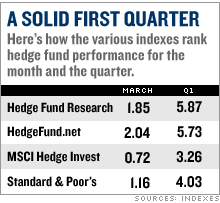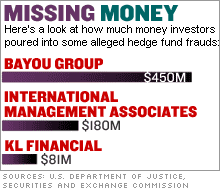|
Hedge funds feel more heat
Three months after hedge funds had to register as investment advisers, regulators are taking a closer look at these funds.
NEW YORK (CNNMoney.com) - It's only been three months since the Securities and Exchange Commission's rule requiring hedge fund managers to register as investment advisers went into effect, and regulators are already cranking up the heat on these funds even more. Sen. Chuck Hagel, R-Neb.,chairman of a Senate Banking subcommittee, said yesterday that he plans to hold hearings on hedge funds on May 16, according to a Reuters report.
Also, SEC Chairman Christopher Cox said at a conference earlier this week that he plans to decide within the next nine to 12 months whether to impose more regulations on the industry. SEC spokesman John Nester said the agency has planned all along to review the industry about a year and a half after the adviser registration rule went into effect, once it has had time to gather enough data from its examinations of advisers. One tenet of the new rule is that the SEC can now conduct random "spot" inspections of investment advisers. Nester said the review will focus on factors such as the size of the industry, the growth rate, and what the Commission uncovered during its examinations of advisers. Hedge funds, which are private investment pools limited to wealthy individuals and institutional investors, now manage $1.2 trillion in assets, according to Chicago-based hedge fund tracker Hedge Fund Research, and though they are limited to the wealthy, more private and public pension plans are investing in these funds on behalf of regular people. Also, regulators and elected officials have expressed a desire to learn more about hedge funds because these funds operate in the public markets. Exams starting in earnest
Since the adviser registration rule went into effect, people in the business say the SEC has wasted no time getting into the offices of hedge fund managers to conduct exams. The SEC's Nester said the SEC plans to examine about 10 to 15 percent of the roughly 1,000 newly registered hedge fund advisers in the next nine to 12 months. "We have clearly seen enhanced attention by the SEC on registered hedge funds in the market with respect to the (examinations) that have been conducted and have seen, in certain circumstances, a very thorough examination of the hedge funds themselves," said Jedd Wider, a partner in the business and finance practice of law firm Morgan Lewis. "The SEC has been doing examinations of newly-registered advisers since Feb. 1, so we have a number of clients that are being examined and that have received requests for information," said Bill Natbony, a partner in the financial services practice of New York law firm Katten Muchin Rosenmann LLP. Natbony said that before an audit, the SEC will send a standard written inquiry, which may be as long as 17 pages, that serves as a comprehensive checklist of the information that advisers will need to pull together for the examination. Wider said the examinations are "a clear indication that the SEC is taking its role with respect to registration very seriously" and added that hedge fund managers can and should expect this attention to continue. The SEC's Nester added that the agency will put a priority on examining "higher risk" advisers, such as those who have had previous convictions, as well as funds with a higher proportion of individual, rather than institutional, investors. But it will also select some advisers at random for inspection. Attorneys who represent hedge funds say the examiners have been asking for information about such factors as how funds value the securities in their portfolios -- a particularly important issue for funds that trade in illiquid assets -- as well as record keeping practices and soft-dollar allocations. Ron Geffner, a partner at law firm Sadis & Goldberg, which has a large hedge fund practice, said some of his firm's clients have been audited. In these cases, the SEC has looked at what Geffner called routine issues, such as checking whether a fund has an independent auditor, how a fund's performance is calculated and explained to investors, how a fund's assets are allocated and how a fund's principals are trading in their personal accounts. Other areas on the SEC's radar are whether a manager is running multiple products, Geffner said, such as running hedge funds along side mutual funds or separate accounts. That practice is rare but not unheard of, and regulators are looking to see whether it creates a conflict of interest for a firm's investors. What to expect if the SEC calls
Attorneys who work with hedge funds say hedge fund managers who have registered as advisers should be prepared for the SEC to come calling. During a typical exam, SEC staffers temporarily set up shop in a hedge fund's offices and comb through its books and records. The SEC makes no promises as to how long its examination will take, and the process can drag on for months, according to people who have survived audits. "It was quite disruptive - every day they'd come back and ask for something else," said Nancy Havens, whose firm, Havens Advisors, was audited from August 2002 to April 2003. "It took a long time, and at the end of the day they found nothing of import." Still, despite the months of disruption, Havens said she still supports adviser registration - and the attendant spot exams - as a means of ferreting out fraud. "There are a lot of ways you can mess around in a hedge fund and if you have the SEC looking over every trade, it's a lot harder" to do that, she said. "There are shades of gray that the SEC will find if they went through the paperwork as thoroughly as they did with us. It's not that hard to do things right." Regulators smarten up on funds
One positive, Geffner noted, is that the examiners seem to have improved their understanding of the industry since 2002, when the SEC first began circulating requests for information to hedge funds as part of a study of the industry. People in the business say the questions the SEC asked then betrayed a lack of understanding about the publicity-shy industry, but now, the questions the SEC is asking are more sophisticated. "In the last 12 months they have gotten up to speed in dealing with the hedge fund community," said Geffner. That's in part because the Commission has beefed up its training program for examiners, requiring some to take a certification exam for "alternative" investment professionals. Alternative investments are funds that operate outside traditional stock and bond fund formats and include hedge funds, private equity and managed futures funds. Craig Asche, executive director of the Chartered Alternative Investment Analyst Association (CAIA), said the SEC began participating in its examination program as a way of learning what kind of questions it should be asking hedge funds during exams. The group administers the CAIA designation to alternative investment professionals who pass its examination process of two four-hour exams that focus on issues such as risk management, due diligence and fund administration. The SEC explained that its examiners were highly trained in banks but lacked experience in examining hedge funds, Asche said. "The SEC's role is to protect the end user, and part of that is recognizing in advance when a problem is developing," said Asche. -------------------- Innovative hedge fund boosts small stocks: Click here.
The blame game: Hedge funds & oil. More here. |
|


